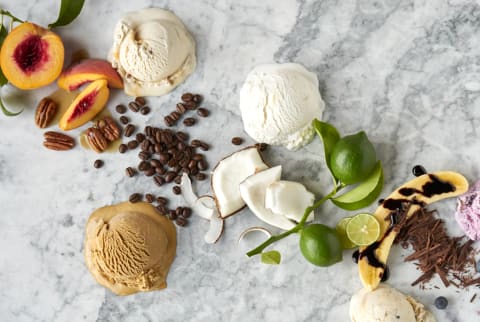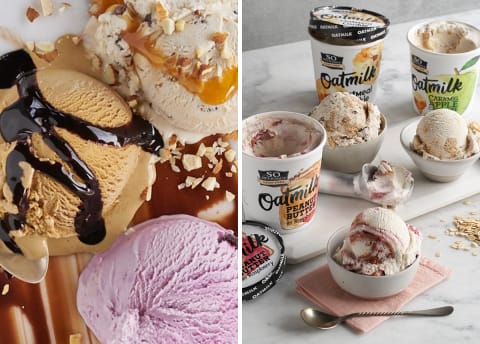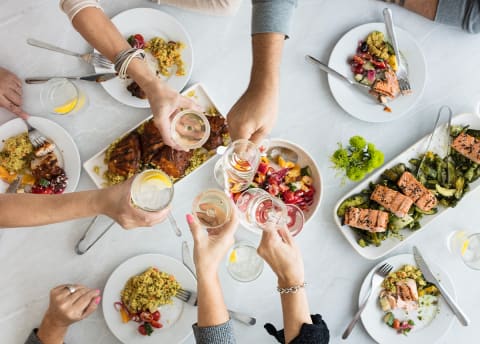Advertisement
5 Ways To Be A More Consciously Minded Cook This Summer

In our eyes, the arrival of summer is the official start of al fresco season: Truly nothing's better than slow, sunny days spent picnicking, grilling, and—if you're anything like us—eating a substantial amount of ice cream. But choosing foods that actively help save the planet and do less harm is a year-round mindset, of course. Keep reading for five impactful ways to savor the best of summer—with a conscience.
1. Summer situation: Your seasonal produce is on the brink of going bad.
Sustainable solve: Put 'em to good use. Food waste is a huge sustainability issue—if it were a country, it would be the third largest emitter of greenhouse gases, behind China and the U.S.—so anytime we think twice about tossing out our food helps. Here are a few ideas to salvage your farmers market haul and all those BBQ leftovers:
- Overripe, now-or-never berries? Freeze them in a single layer on a small sheet pan, then place them in a baggie to use later in smoothies (by freezing them separately, you can easily pluck them out just a few at a time).
- Peaches getting too soft? Puree it up and mix it with seltzer for a refreshing homemade soda.
- Too many cherry tomatoes? Roast them until the skins pop and the liquid reduces to a syrup, then freeze them to use for bruschetta or tomato sauce.
2. Summer situation: Your favorite food is ice cream. (Us, too.)
Sustainable solve: Now's the best time to go dairy-free. Experts have confirmed that avoiding meat and dairy products is the single biggest way to reduce your environmental impact on the planet, and there’s never been tastier ways to do so. Thanks to quality dairy-free brands like So Delicious, dairy-based ice cream and popsicles have finally met their match when it comes to that creamy, must-have-seconds flavor and texture that we expect from our favorite summer treats.

So Delicious’ frozen desserts are Non-GMO Project Verified and offer plant-based options galore—from cashew, coconut, soy, and almond—but new on shelves this summer (and our personal go-to) are the oatmilk frozen dessert flavors: Think Peanut Butter and Raspberry, Oatmeal Cookie, and Caramel Apple Crumble. Find them in these stores!
3. Summer situation: You make a mean grilled fish dinner.
Sustainable solve: Make a fish choice that produced more safely. Sure, fish can be a healthy dinner option, but keep in mind that some seafood species are more sustainable than others—especially considering that almost half the seafood we eat comes from aquaculture farming, a method that has contributed to biodiversity loss in marine habitats.
Research your favorite types of fish on the Environmental Defense Fund’s Seafood Sector to make sure it’s eco-friendly—and if not, consider a more sustainable choice. The EDF defines the best eco-friendly choices as seafood that comes from “healthy, well-managed populations, and the fishing or farming methods used to catch or raise the fish cause little harm to the environment.” (And don’t forget plant-based options for your omega-3’s: You can get a good dose from flax, hemp, soy, and walnuts.)
4. Summer situation: You're hosting a BBQ, and your guests eat all the things.
Sustainable solve: Start looking beyond the "grass-fed" label. More and more food manufacturers are getting serious about regenerative agriculture—a data-backed approach to farming that aims to restore health to our nutrient-depleted soil so that it pulls carbon from out of the air, actually reversing climate change.

These practices take sustainability to the next level, and soon we’ll start seeing labels and more company transparency indicating food from farms that have embraced such practices. This is a big one because, when managed properly, beef production can be regenerative, reducing and potentially even negating agriculture’s heavy environmental impact. Think of this way: If you’re going to have burgers, consider eating meat that actively drew carbon back into the ground, restoring our ecosystems, rather than food grown in a lab.
5. Summer situation: You’re heading into the great outdoors and need some snacks.
Sustainable solution: Cut down on the single-use plastic. The first rule for spending any amount of time out in nature, whether it’s five-mile hike or a camping trip, is to leave no trace. Instead of individually packaged goods, bring your own water bottle and take a few minutes to make your own snacks: For protein, pack a baggie of crispy roasted chickpeas or your own trail mix using nuts, seeds, and dried fruit from the bulk aisle at your grocery store; or try out a no-bake energy ball recipe using plant-based ingredients.
